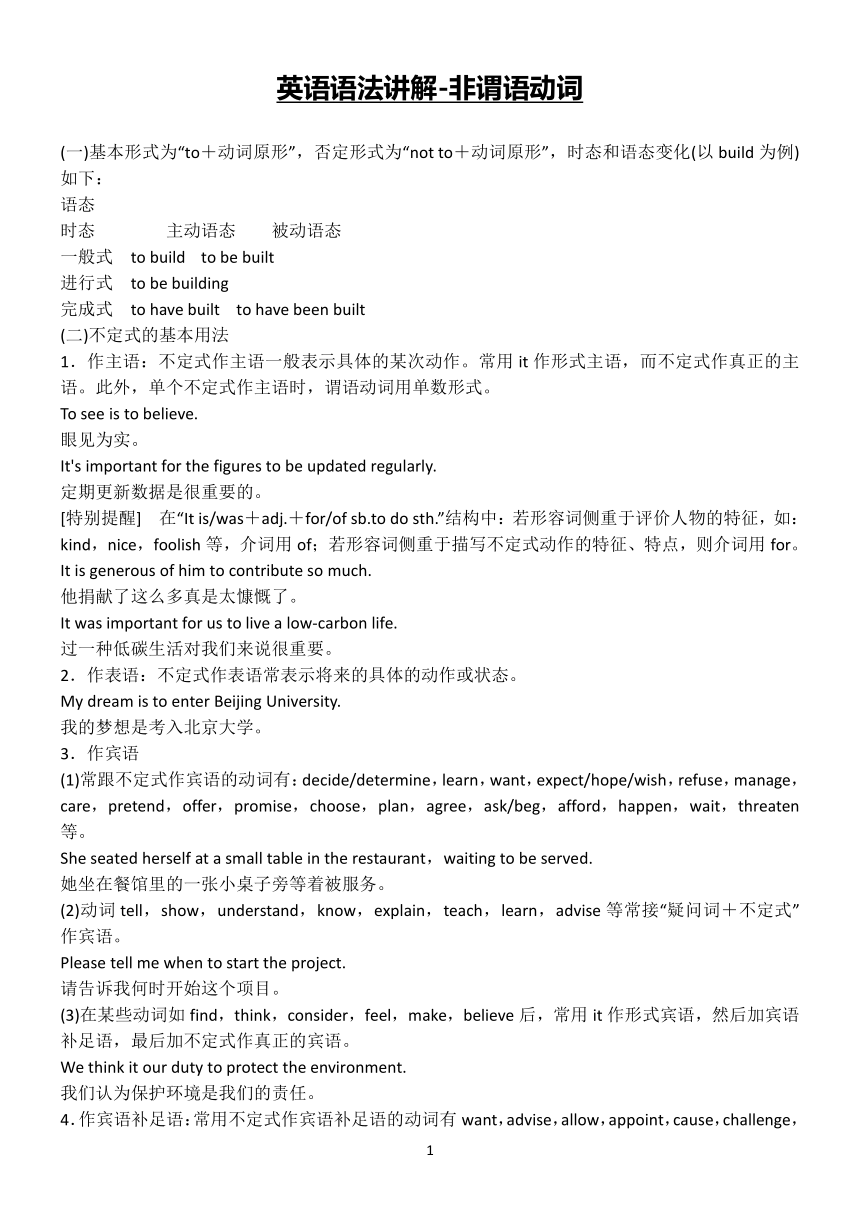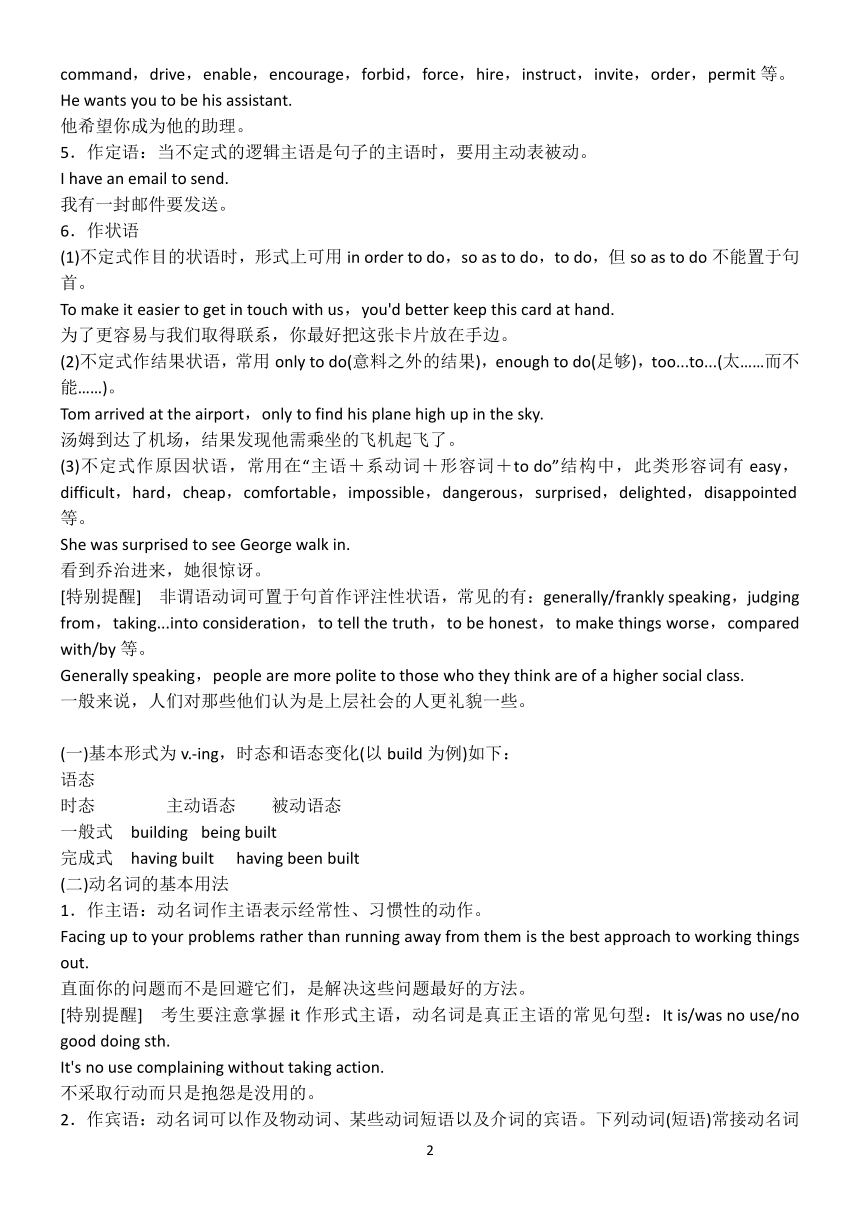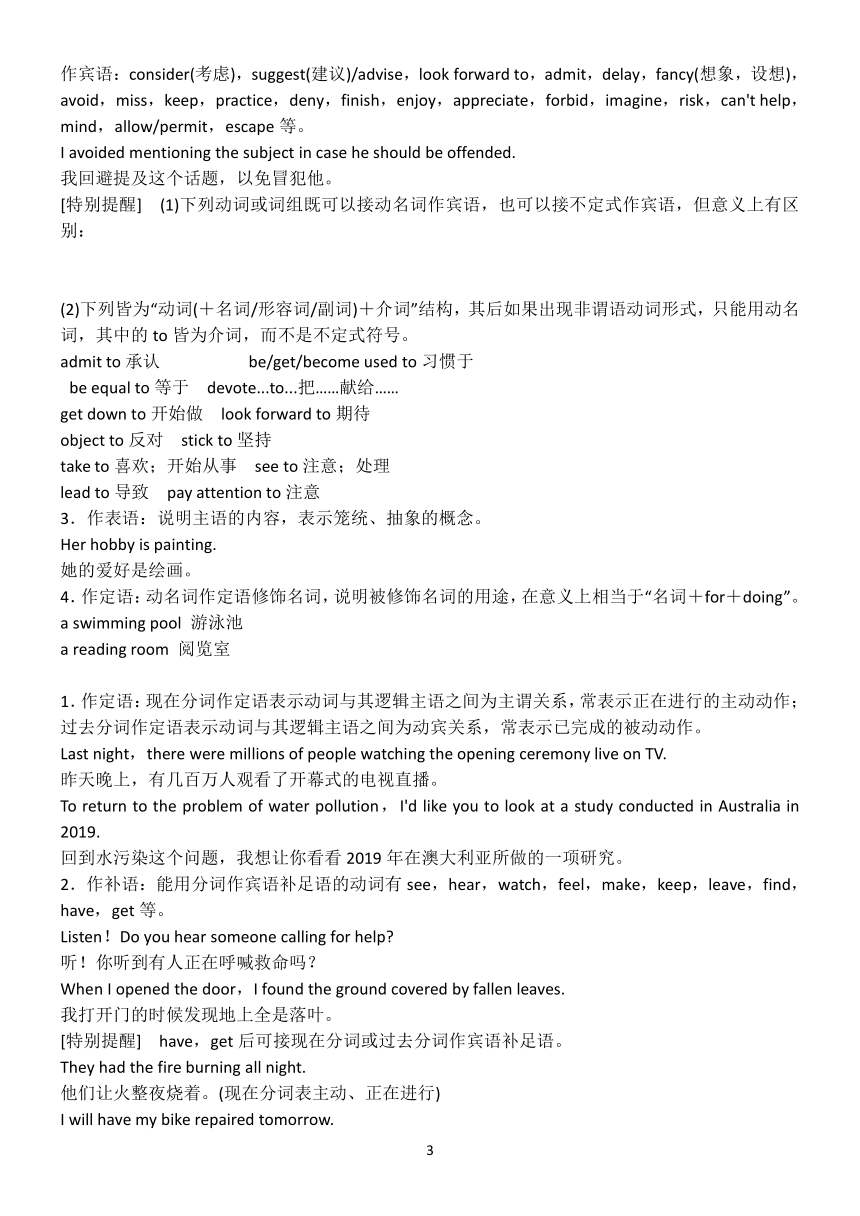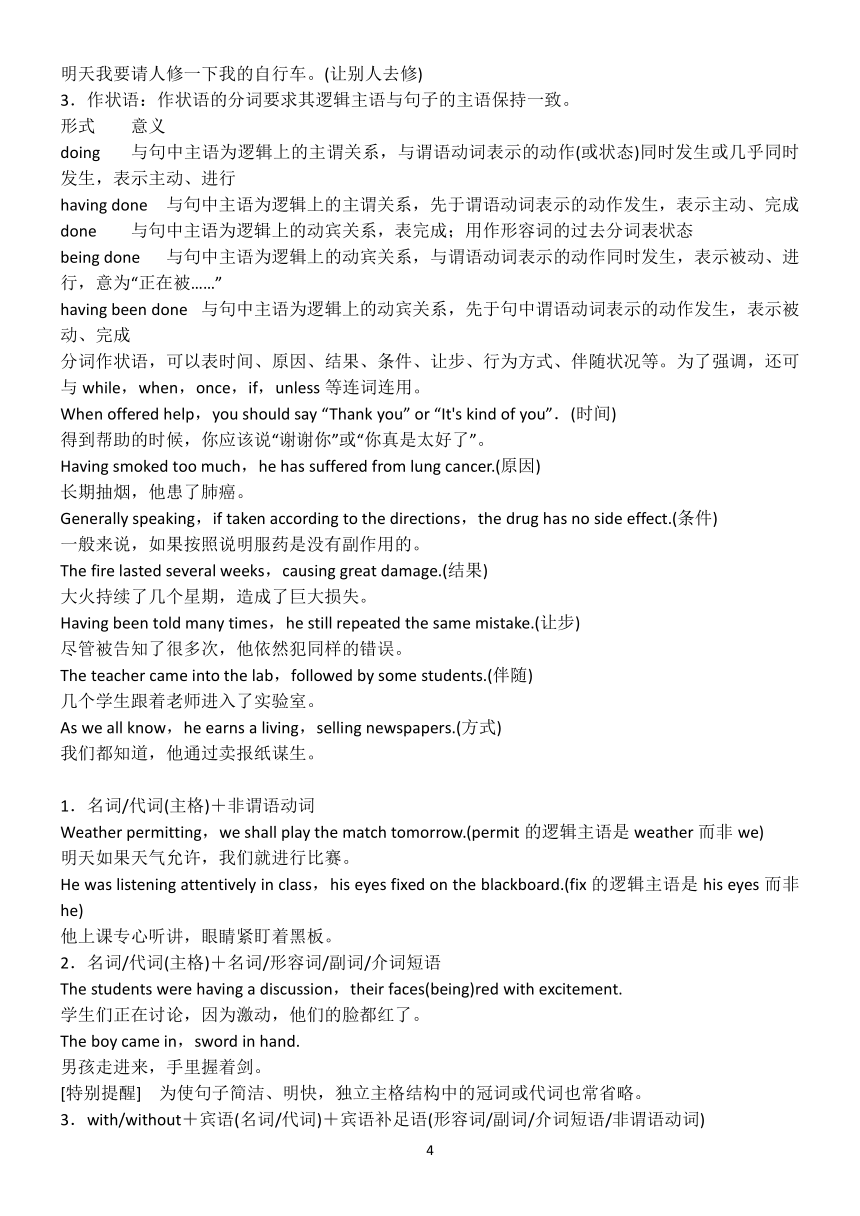高中英语语法讲解-非谓语动词学案(含答案)
文档属性
| 名称 | 高中英语语法讲解-非谓语动词学案(含答案) |  | |
| 格式 | doc | ||
| 文件大小 | 54.9KB | ||
| 资源类型 | 教案 | ||
| 版本资源 | 人教版(2019) | ||
| 科目 | 英语 | ||
| 更新时间 | 2023-06-01 16:56:28 | ||
图片预览




文档简介
英语语法讲解-非谓语动词
(一)基本形式为“to+动词原形”,否定形式为“not to+动词原形”,时态和语态变化(以build为例)如下:
语态
时态 主动语态 被动语态
一般式 to build to be built
进行式 to be building
完成式 to have built to have been built
(二)不定式的基本用法
1.作主语:不定式作主语一般表示具体的某次动作。常用it作形式主语,而不定式作真正的主语。此外,单个不定式作主语时,谓语动词用单数形式。
To see is to believe.
眼见为实。
It's important for the figures to be updated regularly.
定期更新数据是很重要的。
[特别提醒] 在“It is/was+adj.+for/of sb.to do sth.”结构中:若形容词侧重于评价人物的特征,如:kind,nice,foolish等,介词用of;若形容词侧重于描写不定式动作的特征、特点,则介词用for。
It is generous of him to contribute so much.
他捐献了这么多真是太慷慨了。
It was important for us to live a low carbon life.
过一种低碳生活对我们来说很重要。
2.作表语:不定式作表语常表示将来的具体的动作或状态。
My dream is to enter Beijing University.
我的梦想是考入北京大学。
3.作宾语
(1)常跟不定式作宾语的动词有:decide/determine,learn,want,expect/hope/wish,refuse,manage,care,pretend,offer,promise,choose,plan,agree,ask/beg,afford,happen,wait,threaten等。
She seated herself at a small table in the restaurant,waiting to be served.
她坐在餐馆里的一张小桌子旁等着被服务。
(2)动词tell,show,understand,know,explain,teach,learn,advise等常接“疑问词+不定式”作宾语。
Please tell me when to start the project.
请告诉我何时开始这个项目。
(3)在某些动词如find,think,consider,feel,make,believe后,常用it作形式宾语,然后加宾语补足语,最后加不定式作真正的宾语。
We think it our duty to protect the environment.
我们认为保护环境是我们的责任。
4.作宾语补足语:常用不定式作宾语补足语的动词有want,advise,allow,appoint,cause,challenge,command,drive,enable,encourage,forbid,force,hire,instruct,invite,order,permit等。
He wants you to be his assistant.
他希望你成为他的助理。
5.作定语:当不定式的逻辑主语是句子的主语时,要用主动表被动。
I have an email to send.
我有一封邮件要发送。
6.作状语
(1)不定式作目的状语时,形式上可用in order to do,so as to do,to do,但so as to do不能置于句首。
To make it easier to get in touch with us,you'd better keep this card at hand.
为了更容易与我们取得联系,你最好把这张卡片放在手边。
(2)不定式作结果状语,常用only to do(意料之外的结果),enough to do(足够),too...to...(太……而不能……)。
Tom arrived at the airport,only to find his plane high up in the sky.
汤姆到达了机场,结果发现他需乘坐的飞机起飞了。
(3)不定式作原因状语,常用在“主语+系动词+形容词+to do”结构中,此类形容词有easy,difficult,hard,cheap,comfortable,impossible,dangerous,surprised,delighted,disappointed等。
She was surprised to see George walk in.
看到乔治进来,她很惊讶。
[特别提醒] 非谓语动词可置于句首作评注性状语,常见的有:generally/frankly speaking,judging from,taking...into consideration,to tell the truth,to be honest,to make things worse,compared with/by等。
Generally speaking,people are more polite to those who they think are of a higher social class.
一般来说,人们对那些他们认为是上层社会的人更礼貌一些。
(一)基本形式为v. ing,时态和语态变化(以build为例)如下:
语态
时态 主动语态 被动语态
一般式 building being built
完成式 having built having been built
(二)动名词的基本用法
1.作主语:动名词作主语表示经常性、习惯性的动作。
Facing up to your problems rather than running away from them is the best approach to working things out.
直面你的问题而不是回避它们,是解决这些问题最好的方法。
[特别提醒] 考生要注意掌握it作形式主语,动名词是真正主语的常见句型:It is/was no use/no good doing sth.
It's no use complaining without taking action.
不采取行动而只是抱怨是没用的。
2.作宾语:动名词可以作及物动词、某些动词短语以及介词的宾语。下列动词(短语)常接动名词作宾语:consider(考虑),suggest(建议)/advise,look forward to,admit,delay,fancy(想象,设想),avoid,miss,keep,practice,deny,finish,enjoy,appreciate,forbid,imagine,risk,can't help,mind,allow/permit,escape等。
I avoided mentioning the subject in case he should be offended.
我回避提及这个话题,以免冒犯他。
[特别提醒] (1)下列动词或词组既可以接动名词作宾语,也可以接不定式作宾语,但意义上有区别:
(2)下列皆为“动词(+名词/形容词/副词)+介词”结构,其后如果出现非谓语动词形式,只能用动名词,其中的to皆为介词,而不是不定式符号。
admit to承认 be/get/become used to习惯于
be equal to等于 devote...to...把……献给……
get down to开始做 look forward to期待
object to反对 stick to坚持
take to喜欢;开始从事 see to注意;处理
lead to导致 pay attention to注意
3.作表语:说明主语的内容,表示笼统、抽象的概念。
Her hobby is painting.
她的爱好是绘画。
4.作定语:动名词作定语修饰名词,说明被修饰名词的用途,在意义上相当于“名词+for+doing”。
a swimming pool 游泳池
a reading room 阅览室
1.作定语:现在分词作定语表示动词与其逻辑主语之间为主谓关系,常表示正在进行的主动动作;过去分词作定语表示动词与其逻辑主语之间为动宾关系,常表示已完成的被动动作。
Last night,there were millions of people watching the opening ceremony live on TV.
昨天晚上,有几百万人观看了开幕式的电视直播。
To return to the problem of water pollution,I'd like you to look at a study conducted in Australia in 2019.
回到水污染这个问题,我想让你看看2019年在澳大利亚所做的一项研究。
2.作补语:能用分词作宾语补足语的动词有see,hear,watch,feel,make,keep,leave,find,have,get等。
Listen!Do you hear someone calling for help
听!你听到有人正在呼喊救命吗?
When I opened the door,I found the ground covered by fallen leaves.
我打开门的时候发现地上全是落叶。
[特别提醒] have,get后可接现在分词或过去分词作宾语补足语。
They had the fire burning all night.
他们让火整夜烧着。(现在分词表主动、正在进行)
I will have my bike repaired tomorrow.
明天我要请人修一下我的自行车。(让别人去修)
3.作状语:作状语的分词要求其逻辑主语与句子的主语保持一致。
形式 意义
doing 与句中主语为逻辑上的主谓关系,与谓语动词表示的动作(或状态)同时发生或几乎同时发生,表示主动、进行
having done 与句中主语为逻辑上的主谓关系,先于谓语动词表示的动作发生,表示主动、完成
done 与句中主语为逻辑上的动宾关系,表完成;用作形容词的过去分词表状态
being done 与句中主语为逻辑上的动宾关系,与谓语动词表示的动作同时发生,表示被动、进行,意为“正在被……”
having been done 与句中主语为逻辑上的动宾关系,先于句中谓语动词表示的动作发生,表示被动、完成
分词作状语,可以表时间、原因、结果、条件、让步、行为方式、伴随状况等。为了强调,还可与while,when,once,if,unless等连词连用。
When offered help,you should say “Thank you” or “It's kind of you”.(时间)
得到帮助的时候,你应该说“谢谢你”或“你真是太好了”。
Having smoked too much,he has suffered from lung cancer.(原因)
长期抽烟,他患了肺癌。
Generally speaking,if taken according to the directions,the drug has no side effect.(条件)
一般来说,如果按照说明服药是没有副作用的。
The fire lasted several weeks,causing great damage.(结果)
大火持续了几个星期,造成了巨大损失。
Having been told many times,he still repeated the same mistake.(让步)
尽管被告知了很多次,他依然犯同样的错误。
The teacher came into the lab,followed by some students.(伴随)
几个学生跟着老师进入了实验室。
As we all know,he earns a living,selling newspapers.(方式)
我们都知道,他通过卖报纸谋生。
1.名词/代词(主格)+非谓语动词
Weather permitting,we shall play the match tomorrow.(permit的逻辑主语是weather而非we)
明天如果天气允许,我们就进行比赛。
He was listening attentively in class,his eyes fixed on the blackboard.(fix的逻辑主语是his eyes而非he)
他上课专心听讲,眼睛紧盯着黑板。
2.名词/代词(主格)+名词/形容词/副词/介词短语
The students were having a discussion,their faces(being)red with excitement.
学生们正在讨论,因为激动,他们的脸都红了。
The boy came in,sword in hand.
男孩走进来,手里握着剑。
[特别提醒] 为使句子简洁、明快,独立主格结构中的冠词或代词也常省略。
3.with/without+宾语(名词/代词)+宾语补足语(形容词/副词/介词短语/非谓语动词)
几乎所有的独立主格结构都可在其逻辑主语前加上with/without,构成with/without复合结构。
Without anyone noticing,I stole into the room.
没有人注意,我偷偷地溜进了房间。
非谓语动词解题“三字诀”——析、找、定
一析:分析句子结构
若句中已有谓语动词且该谓语动词没有通过并列连词与括号中的动词并列,则应考虑非谓语动词形式。
[语法填空典例]
题组一
① ________(call)me tomorrow and I'll let you know the lab result.
② ________(call)me tomorrow,you'll know the lab result.
分析:两句的差别是连词and。分析句子结构可知,①句为句式“祈使句+and+陈述句”;②句为分词短语作条件状语。故①填Call;②填Calling。
二找:找准所给词的逻辑主语
找准所给词的逻辑主语,然后分析非谓语动词与逻辑主语之间是主谓关系还是动宾关系:若是主谓关系用现在分词形式,若是动宾关系则用过去分词形式。
题组二
①With the guide ________(lead)the way,we had no trouble getting out of the forest.
②The guide ________(lead)the way,so we had no trouble getting out of the forest.
分析:分析句子结构可知,①句为with复合结构作状语,动词lead与逻辑主语the guide之间为主谓关系;②句so连接两个并列分句,空格处所填词的时态应与第二个并列分句的谓语动词一致。故①填leading;②填led。
三定:确定非谓语动词的时态
根据非谓语动词的动作与谓语动词的动作发生的先后顺序确定用一般式还是完成式。若非谓语动词表示的动作与谓语动词表示的动作同时发生,则用一般式;若非谓语动词的动作发生在谓语动词之前,则用完成式。
题组三
①________(fail)to reach them on the phone,we sent an e mail instead.
②________(walk)in the fields,he could feel the warmth of spring.
分析:①句fail表示的动作发生在谓语动词sent之前且与主语we为逻辑上的主谓关系,因此用现在分词的完成式Having failed。②句walk与谓语动词feel为同时发生的动作且与主语he为逻辑上的主谓关系,因此用现在分词的一般式Walking。
Ⅰ.单句语法填空
1.(2020·山西太原期中考试)Now,it not only devotes itself to selling(sell)books,but combines the functions of the bookstore,cafe and the sale of creative cultural products.
2.(2020·河南洛阳期中)Designated a “City of Design” by UNESCO in 2008,Shenzhen was the first city in China to__present(present)an official strategy around creative development.
3.(2020·河南郑州一中六次测试)But by 1955,the paintings were beginning to become difficult to__see(see).
4.(2020·山西长治五校联考)To__catch__(catch)a glimpse of the magnificent treasure of nature,we took a bus from La Serena to a nearby town and then rented a car to go to the desert.
5.(2020·河北名校联盟质检)Mary will never forget the first time she saw him.He suddenly appeared in class one day,wearing(wear)sunglasses.
6.(2020·河南郑州一次质检)We should prevent the river from being__polluted(pollute).
7.(2020·湖北宜昌阶段考)Realizing__(realize)it was our last high school sports meeting,we decided to make it an unforgettable experience for all of us.
8.(2020·海南儋州统测)Cha,better known(know)by his pen name Jin Yong,died on Tuesday at the Hong Kong Sanatorium & Hospital at age 94.
9.(2020·安徽“江淮十校”第一次联考)He tried his key in some of the cars,but people passing(pass)by gave him a look he didn't like.
10.(2020·河北十校联考)Mr.Smith's doctor suggested not eating(eat)cold food these days.
Ⅱ.单句改错
1.(2020·福建泉港期中联考)Comparing with other teachers,Mr.Moore pays more attention to his way of paring→Compared
2.(2020·湖北孝感五校期中联考)True friendship is the communication of the hearts and understand of the souls.understand→understanding
3.(2020·湖北宜昌示范性高中协作体期中)At first,seen the waves coming one after another,I was afraid.seen→seeing
4.(2020·全国百校联盟一次联考)Instead of seek a shelter,my parents suggested we help a couple of stall owners pack their books.seek→seeking
5.(2020·河南郑州一次质检)We're never going to have enough time explore everything!explore前加to
Ⅲ.语法填空
(2020·石家庄质量检测)When it comes to eating habits,China is a country we must mention.Unlike in the West,1.____________ everyone has their own plate of food,in China the dishes 2.____________(place)on the table and everybody shares.If you're being treated by a Chinese host,be prepared for a ton of food.
During eating,the host serves food with public chopsticks to guests 3.____________(show)his or her politeness.The appropriate thing to do is to eat the food and say how delicious it is.If you don't like it,you can just say a polite “thank you”,with the food 4.____________(leave)there.But don't stick your chopsticks upright in the rice bowl.If so,it's very impolite 5.____________ the host and seniors who are present at the table.
At dinner,if half of the fish is eaten up,a guest shouldn't turn the fish over by saying “fan”,which is 6.____________ Chinese word for “turn over”,which is considered bad luck for 7.____________(fisherman)and their boats.The 8.____________(separate)of the fish bone from the lower half of the flesh is usually done by the host or hostess.This is especially true in southern China.
These tips above will be 9.____________(extreme)useful when you visit China,an 10.____________(east)country with a long history.
[语篇解读] 本文是一篇说明文。文章主要介绍了中国的餐桌文化。就餐礼仪因文化不同而不同。
1.解析:考查定语从句。空处引导定语从句,修饰先行词the West,同时在从句中作地点状语,故填where。
答案:where
2.解析:考查动词的时态和语态。句子讲述的是客观情况,要用一般现在时;主语the dishes与动词place之间是动宾关系,所以要用被动语态。
答案:are placed
3.解析:考查非谓语动词。主人用公筷夹菜给客人,这是为了表示对客人的礼貌。空处作目的状语,应用动词不定式。
答案:to show
4.解析:考查非谓语动词。此处为with复合结构,空处作宾语the food的补足语,并且the food与leave之间是逻辑上的动宾关系,所以要用过去分词。
答案:left
5.解析:考查介词。be polite/impolite to sb.是固定短语,意思是“对某人礼貌/不礼貌”。
答案:to
6.解析:考查冠词。“fan”在汉字里表示“翻过来”的意思。此处表示特指,故要用定冠词the。
答案:the
7.解析:考查名词的单复数。fisherman为可数名词,且其前无限定词修饰,故空处应用名词的复数形式。
答案:fishermen
8.解析:考查词性转换。空处前面有定冠词The修饰,再结合空后的of可知,空处应填名词。
答案:separation
9.解析:考查词性转换。空处修饰后面的形容词useful,作状语,要用副词。
答案:extremely
10.解析:考查词性转换。空处作定语,修饰后面的名词country,表示“东方的”,所以要用eastern。
答案:eastern
Ⅳ.短文改错
I moved to London a few of months ago.Many nights on my way home from work I find the same old lady walking down the street with some plastic shopping bag in her hands.She frequent stopped and rested when going back home,so I followed her one night but found out which house she went into.Then on my way home next day,I parked my car and walked to the house.At the front door I left a folding cart(折叠车)with big wheels,where could roll easily.Yesterday I saw him pulling the cart down the street.I was pleased to seeing she was having a good shopping experience than before.
答案:
I moved to London a few months ago.Many nights on my way home from work I the same old lady walking down the street with some plastic shopping in her hands.She stopped and rested when going back home,so I followed her one night found out which house she went into.Then on my way home next day,I parked my car and walked to the house.At the front door I left a folding cart(折叠车)with big wheels, could roll easily.Yesterday I saw pulling the cart down the street.I was pleased to she was having a shopping experience than before.
(一)基本形式为“to+动词原形”,否定形式为“not to+动词原形”,时态和语态变化(以build为例)如下:
语态
时态 主动语态 被动语态
一般式 to build to be built
进行式 to be building
完成式 to have built to have been built
(二)不定式的基本用法
1.作主语:不定式作主语一般表示具体的某次动作。常用it作形式主语,而不定式作真正的主语。此外,单个不定式作主语时,谓语动词用单数形式。
To see is to believe.
眼见为实。
It's important for the figures to be updated regularly.
定期更新数据是很重要的。
[特别提醒] 在“It is/was+adj.+for/of sb.to do sth.”结构中:若形容词侧重于评价人物的特征,如:kind,nice,foolish等,介词用of;若形容词侧重于描写不定式动作的特征、特点,则介词用for。
It is generous of him to contribute so much.
他捐献了这么多真是太慷慨了。
It was important for us to live a low carbon life.
过一种低碳生活对我们来说很重要。
2.作表语:不定式作表语常表示将来的具体的动作或状态。
My dream is to enter Beijing University.
我的梦想是考入北京大学。
3.作宾语
(1)常跟不定式作宾语的动词有:decide/determine,learn,want,expect/hope/wish,refuse,manage,care,pretend,offer,promise,choose,plan,agree,ask/beg,afford,happen,wait,threaten等。
She seated herself at a small table in the restaurant,waiting to be served.
她坐在餐馆里的一张小桌子旁等着被服务。
(2)动词tell,show,understand,know,explain,teach,learn,advise等常接“疑问词+不定式”作宾语。
Please tell me when to start the project.
请告诉我何时开始这个项目。
(3)在某些动词如find,think,consider,feel,make,believe后,常用it作形式宾语,然后加宾语补足语,最后加不定式作真正的宾语。
We think it our duty to protect the environment.
我们认为保护环境是我们的责任。
4.作宾语补足语:常用不定式作宾语补足语的动词有want,advise,allow,appoint,cause,challenge,command,drive,enable,encourage,forbid,force,hire,instruct,invite,order,permit等。
He wants you to be his assistant.
他希望你成为他的助理。
5.作定语:当不定式的逻辑主语是句子的主语时,要用主动表被动。
I have an email to send.
我有一封邮件要发送。
6.作状语
(1)不定式作目的状语时,形式上可用in order to do,so as to do,to do,但so as to do不能置于句首。
To make it easier to get in touch with us,you'd better keep this card at hand.
为了更容易与我们取得联系,你最好把这张卡片放在手边。
(2)不定式作结果状语,常用only to do(意料之外的结果),enough to do(足够),too...to...(太……而不能……)。
Tom arrived at the airport,only to find his plane high up in the sky.
汤姆到达了机场,结果发现他需乘坐的飞机起飞了。
(3)不定式作原因状语,常用在“主语+系动词+形容词+to do”结构中,此类形容词有easy,difficult,hard,cheap,comfortable,impossible,dangerous,surprised,delighted,disappointed等。
She was surprised to see George walk in.
看到乔治进来,她很惊讶。
[特别提醒] 非谓语动词可置于句首作评注性状语,常见的有:generally/frankly speaking,judging from,taking...into consideration,to tell the truth,to be honest,to make things worse,compared with/by等。
Generally speaking,people are more polite to those who they think are of a higher social class.
一般来说,人们对那些他们认为是上层社会的人更礼貌一些。
(一)基本形式为v. ing,时态和语态变化(以build为例)如下:
语态
时态 主动语态 被动语态
一般式 building being built
完成式 having built having been built
(二)动名词的基本用法
1.作主语:动名词作主语表示经常性、习惯性的动作。
Facing up to your problems rather than running away from them is the best approach to working things out.
直面你的问题而不是回避它们,是解决这些问题最好的方法。
[特别提醒] 考生要注意掌握it作形式主语,动名词是真正主语的常见句型:It is/was no use/no good doing sth.
It's no use complaining without taking action.
不采取行动而只是抱怨是没用的。
2.作宾语:动名词可以作及物动词、某些动词短语以及介词的宾语。下列动词(短语)常接动名词作宾语:consider(考虑),suggest(建议)/advise,look forward to,admit,delay,fancy(想象,设想),avoid,miss,keep,practice,deny,finish,enjoy,appreciate,forbid,imagine,risk,can't help,mind,allow/permit,escape等。
I avoided mentioning the subject in case he should be offended.
我回避提及这个话题,以免冒犯他。
[特别提醒] (1)下列动词或词组既可以接动名词作宾语,也可以接不定式作宾语,但意义上有区别:
(2)下列皆为“动词(+名词/形容词/副词)+介词”结构,其后如果出现非谓语动词形式,只能用动名词,其中的to皆为介词,而不是不定式符号。
admit to承认 be/get/become used to习惯于
be equal to等于 devote...to...把……献给……
get down to开始做 look forward to期待
object to反对 stick to坚持
take to喜欢;开始从事 see to注意;处理
lead to导致 pay attention to注意
3.作表语:说明主语的内容,表示笼统、抽象的概念。
Her hobby is painting.
她的爱好是绘画。
4.作定语:动名词作定语修饰名词,说明被修饰名词的用途,在意义上相当于“名词+for+doing”。
a swimming pool 游泳池
a reading room 阅览室
1.作定语:现在分词作定语表示动词与其逻辑主语之间为主谓关系,常表示正在进行的主动动作;过去分词作定语表示动词与其逻辑主语之间为动宾关系,常表示已完成的被动动作。
Last night,there were millions of people watching the opening ceremony live on TV.
昨天晚上,有几百万人观看了开幕式的电视直播。
To return to the problem of water pollution,I'd like you to look at a study conducted in Australia in 2019.
回到水污染这个问题,我想让你看看2019年在澳大利亚所做的一项研究。
2.作补语:能用分词作宾语补足语的动词有see,hear,watch,feel,make,keep,leave,find,have,get等。
Listen!Do you hear someone calling for help
听!你听到有人正在呼喊救命吗?
When I opened the door,I found the ground covered by fallen leaves.
我打开门的时候发现地上全是落叶。
[特别提醒] have,get后可接现在分词或过去分词作宾语补足语。
They had the fire burning all night.
他们让火整夜烧着。(现在分词表主动、正在进行)
I will have my bike repaired tomorrow.
明天我要请人修一下我的自行车。(让别人去修)
3.作状语:作状语的分词要求其逻辑主语与句子的主语保持一致。
形式 意义
doing 与句中主语为逻辑上的主谓关系,与谓语动词表示的动作(或状态)同时发生或几乎同时发生,表示主动、进行
having done 与句中主语为逻辑上的主谓关系,先于谓语动词表示的动作发生,表示主动、完成
done 与句中主语为逻辑上的动宾关系,表完成;用作形容词的过去分词表状态
being done 与句中主语为逻辑上的动宾关系,与谓语动词表示的动作同时发生,表示被动、进行,意为“正在被……”
having been done 与句中主语为逻辑上的动宾关系,先于句中谓语动词表示的动作发生,表示被动、完成
分词作状语,可以表时间、原因、结果、条件、让步、行为方式、伴随状况等。为了强调,还可与while,when,once,if,unless等连词连用。
When offered help,you should say “Thank you” or “It's kind of you”.(时间)
得到帮助的时候,你应该说“谢谢你”或“你真是太好了”。
Having smoked too much,he has suffered from lung cancer.(原因)
长期抽烟,他患了肺癌。
Generally speaking,if taken according to the directions,the drug has no side effect.(条件)
一般来说,如果按照说明服药是没有副作用的。
The fire lasted several weeks,causing great damage.(结果)
大火持续了几个星期,造成了巨大损失。
Having been told many times,he still repeated the same mistake.(让步)
尽管被告知了很多次,他依然犯同样的错误。
The teacher came into the lab,followed by some students.(伴随)
几个学生跟着老师进入了实验室。
As we all know,he earns a living,selling newspapers.(方式)
我们都知道,他通过卖报纸谋生。
1.名词/代词(主格)+非谓语动词
Weather permitting,we shall play the match tomorrow.(permit的逻辑主语是weather而非we)
明天如果天气允许,我们就进行比赛。
He was listening attentively in class,his eyes fixed on the blackboard.(fix的逻辑主语是his eyes而非he)
他上课专心听讲,眼睛紧盯着黑板。
2.名词/代词(主格)+名词/形容词/副词/介词短语
The students were having a discussion,their faces(being)red with excitement.
学生们正在讨论,因为激动,他们的脸都红了。
The boy came in,sword in hand.
男孩走进来,手里握着剑。
[特别提醒] 为使句子简洁、明快,独立主格结构中的冠词或代词也常省略。
3.with/without+宾语(名词/代词)+宾语补足语(形容词/副词/介词短语/非谓语动词)
几乎所有的独立主格结构都可在其逻辑主语前加上with/without,构成with/without复合结构。
Without anyone noticing,I stole into the room.
没有人注意,我偷偷地溜进了房间。
非谓语动词解题“三字诀”——析、找、定
一析:分析句子结构
若句中已有谓语动词且该谓语动词没有通过并列连词与括号中的动词并列,则应考虑非谓语动词形式。
[语法填空典例]
题组一
① ________(call)me tomorrow and I'll let you know the lab result.
② ________(call)me tomorrow,you'll know the lab result.
分析:两句的差别是连词and。分析句子结构可知,①句为句式“祈使句+and+陈述句”;②句为分词短语作条件状语。故①填Call;②填Calling。
二找:找准所给词的逻辑主语
找准所给词的逻辑主语,然后分析非谓语动词与逻辑主语之间是主谓关系还是动宾关系:若是主谓关系用现在分词形式,若是动宾关系则用过去分词形式。
题组二
①With the guide ________(lead)the way,we had no trouble getting out of the forest.
②The guide ________(lead)the way,so we had no trouble getting out of the forest.
分析:分析句子结构可知,①句为with复合结构作状语,动词lead与逻辑主语the guide之间为主谓关系;②句so连接两个并列分句,空格处所填词的时态应与第二个并列分句的谓语动词一致。故①填leading;②填led。
三定:确定非谓语动词的时态
根据非谓语动词的动作与谓语动词的动作发生的先后顺序确定用一般式还是完成式。若非谓语动词表示的动作与谓语动词表示的动作同时发生,则用一般式;若非谓语动词的动作发生在谓语动词之前,则用完成式。
题组三
①________(fail)to reach them on the phone,we sent an e mail instead.
②________(walk)in the fields,he could feel the warmth of spring.
分析:①句fail表示的动作发生在谓语动词sent之前且与主语we为逻辑上的主谓关系,因此用现在分词的完成式Having failed。②句walk与谓语动词feel为同时发生的动作且与主语he为逻辑上的主谓关系,因此用现在分词的一般式Walking。
Ⅰ.单句语法填空
1.(2020·山西太原期中考试)Now,it not only devotes itself to selling(sell)books,but combines the functions of the bookstore,cafe and the sale of creative cultural products.
2.(2020·河南洛阳期中)Designated a “City of Design” by UNESCO in 2008,Shenzhen was the first city in China to__present(present)an official strategy around creative development.
3.(2020·河南郑州一中六次测试)But by 1955,the paintings were beginning to become difficult to__see(see).
4.(2020·山西长治五校联考)To__catch__(catch)a glimpse of the magnificent treasure of nature,we took a bus from La Serena to a nearby town and then rented a car to go to the desert.
5.(2020·河北名校联盟质检)Mary will never forget the first time she saw him.He suddenly appeared in class one day,wearing(wear)sunglasses.
6.(2020·河南郑州一次质检)We should prevent the river from being__polluted(pollute).
7.(2020·湖北宜昌阶段考)Realizing__(realize)it was our last high school sports meeting,we decided to make it an unforgettable experience for all of us.
8.(2020·海南儋州统测)Cha,better known(know)by his pen name Jin Yong,died on Tuesday at the Hong Kong Sanatorium & Hospital at age 94.
9.(2020·安徽“江淮十校”第一次联考)He tried his key in some of the cars,but people passing(pass)by gave him a look he didn't like.
10.(2020·河北十校联考)Mr.Smith's doctor suggested not eating(eat)cold food these days.
Ⅱ.单句改错
1.(2020·福建泉港期中联考)Comparing with other teachers,Mr.Moore pays more attention to his way of paring→Compared
2.(2020·湖北孝感五校期中联考)True friendship is the communication of the hearts and understand of the souls.understand→understanding
3.(2020·湖北宜昌示范性高中协作体期中)At first,seen the waves coming one after another,I was afraid.seen→seeing
4.(2020·全国百校联盟一次联考)Instead of seek a shelter,my parents suggested we help a couple of stall owners pack their books.seek→seeking
5.(2020·河南郑州一次质检)We're never going to have enough time explore everything!explore前加to
Ⅲ.语法填空
(2020·石家庄质量检测)When it comes to eating habits,China is a country we must mention.Unlike in the West,1.____________ everyone has their own plate of food,in China the dishes 2.____________(place)on the table and everybody shares.If you're being treated by a Chinese host,be prepared for a ton of food.
During eating,the host serves food with public chopsticks to guests 3.____________(show)his or her politeness.The appropriate thing to do is to eat the food and say how delicious it is.If you don't like it,you can just say a polite “thank you”,with the food 4.____________(leave)there.But don't stick your chopsticks upright in the rice bowl.If so,it's very impolite 5.____________ the host and seniors who are present at the table.
At dinner,if half of the fish is eaten up,a guest shouldn't turn the fish over by saying “fan”,which is 6.____________ Chinese word for “turn over”,which is considered bad luck for 7.____________(fisherman)and their boats.The 8.____________(separate)of the fish bone from the lower half of the flesh is usually done by the host or hostess.This is especially true in southern China.
These tips above will be 9.____________(extreme)useful when you visit China,an 10.____________(east)country with a long history.
[语篇解读] 本文是一篇说明文。文章主要介绍了中国的餐桌文化。就餐礼仪因文化不同而不同。
1.解析:考查定语从句。空处引导定语从句,修饰先行词the West,同时在从句中作地点状语,故填where。
答案:where
2.解析:考查动词的时态和语态。句子讲述的是客观情况,要用一般现在时;主语the dishes与动词place之间是动宾关系,所以要用被动语态。
答案:are placed
3.解析:考查非谓语动词。主人用公筷夹菜给客人,这是为了表示对客人的礼貌。空处作目的状语,应用动词不定式。
答案:to show
4.解析:考查非谓语动词。此处为with复合结构,空处作宾语the food的补足语,并且the food与leave之间是逻辑上的动宾关系,所以要用过去分词。
答案:left
5.解析:考查介词。be polite/impolite to sb.是固定短语,意思是“对某人礼貌/不礼貌”。
答案:to
6.解析:考查冠词。“fan”在汉字里表示“翻过来”的意思。此处表示特指,故要用定冠词the。
答案:the
7.解析:考查名词的单复数。fisherman为可数名词,且其前无限定词修饰,故空处应用名词的复数形式。
答案:fishermen
8.解析:考查词性转换。空处前面有定冠词The修饰,再结合空后的of可知,空处应填名词。
答案:separation
9.解析:考查词性转换。空处修饰后面的形容词useful,作状语,要用副词。
答案:extremely
10.解析:考查词性转换。空处作定语,修饰后面的名词country,表示“东方的”,所以要用eastern。
答案:eastern
Ⅳ.短文改错
I moved to London a few of months ago.Many nights on my way home from work I find the same old lady walking down the street with some plastic shopping bag in her hands.She frequent stopped and rested when going back home,so I followed her one night but found out which house she went into.Then on my way home next day,I parked my car and walked to the house.At the front door I left a folding cart(折叠车)with big wheels,where could roll easily.Yesterday I saw him pulling the cart down the street.I was pleased to seeing she was having a good shopping experience than before.
答案:
I moved to London a few months ago.Many nights on my way home from work I the same old lady walking down the street with some plastic shopping in her hands.She stopped and rested when going back home,so I followed her one night found out which house she went into.Then on my way home next day,I parked my car and walked to the house.At the front door I left a folding cart(折叠车)with big wheels, could roll easily.Yesterday I saw pulling the cart down the street.I was pleased to she was having a shopping experience than before.
